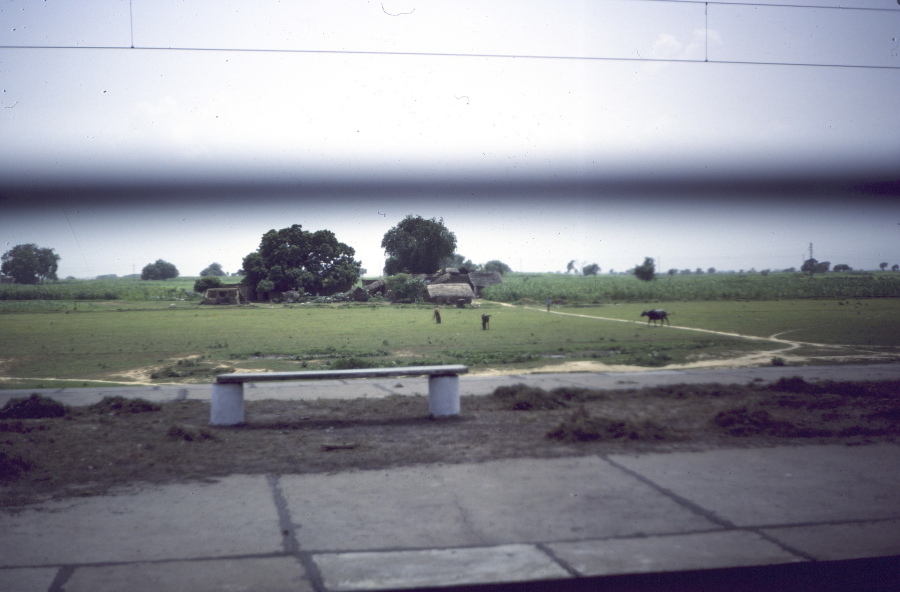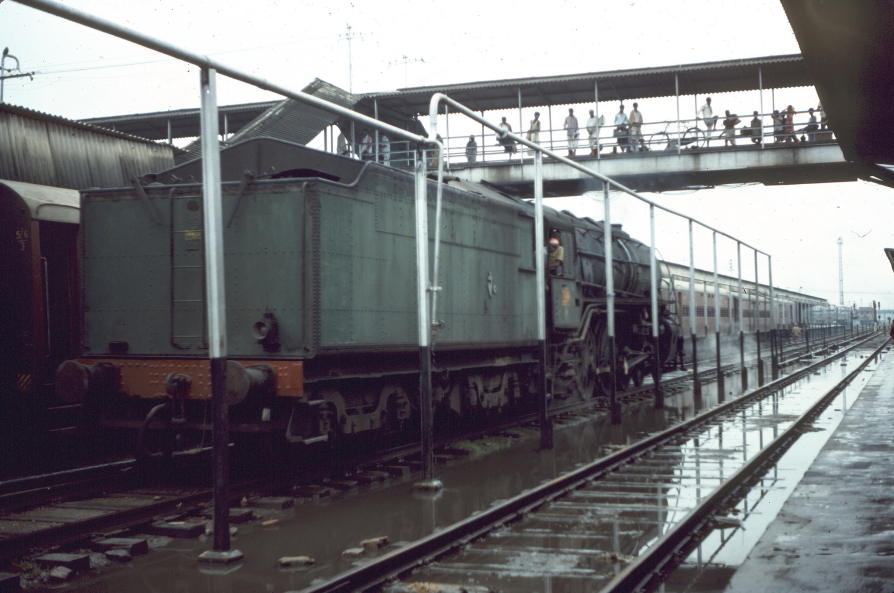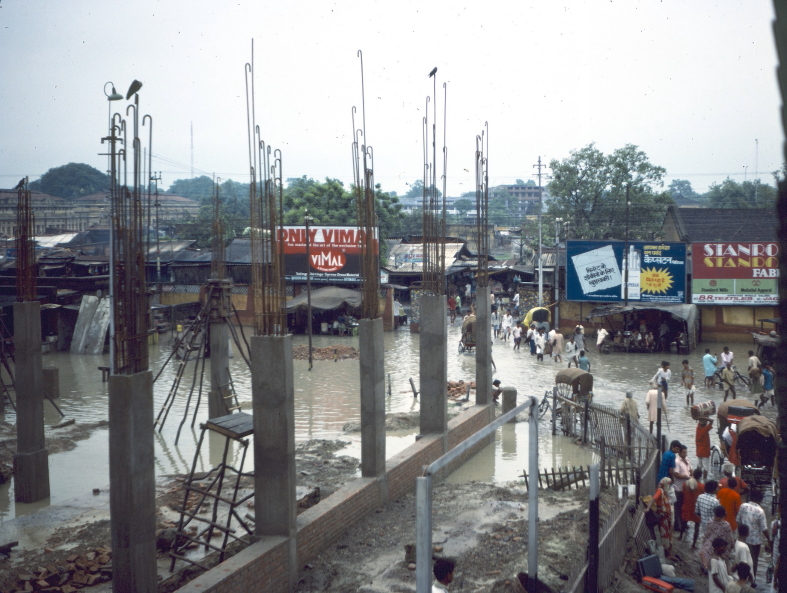Sunday 23rd August: Day of rest near Delhi
We went swimming in the morning at a pool used by the ex-pat families. Wow - what service, nimbupanis served on silver trays by very polite waiters in white jackets who quietly appeared every time I climbed out of the pool. The only problem was the heat - the tiled floors and the metal handrails were too hot to touch - what luxury! What a contrast to the grime and squalor of yesterday. Then back home for lunch and siesta.
In the evening we went to the Qutb Minar a UNESCO world heritage site. At over 70m it is the highest in India.
It was build in the 12th century to by the Muslim leader to celebrate his domination over Delhi and it is carved with verses of the Quran. It was impressive, tapering from its wide girth at the base to a relatively slim diameter at the top. Impressive.. but too dark to take any photographs, at least with the very slow film I had. So much for the advice of my photographer friends - "go for slow and rich colour - there will be plenty of light".
Near the minar there is an iron pillar² about 15 feet tall, tapering towards the top, and superstition says that it is lucky to stand with your back pressed towards it and your arms bend backwards around it. Ben and Jane had managed quite well, but when I tried a young man tried to help me. He twisted my arms backwards and I thought my elbow would break. Then he asked Ben to pay him for assisting me.
As the evening drew on we went for a walk across a piece of open land strewn with rocks and wells. Despite the ants it was pleasant enough and although we had been warned about snakes we didn't see any. Tomorrow we would be setting off for Mazafarpur on our way to Nepal, but for now it was nice not to be pestered and stared at which, I realised by their absence, had already become very tiring.
Monday 24th August: Day 1 on the train
Leisurely breakfast to be savoured: French toast, tea without sugar (very nice) - probably the last decent food for ages, then off to catch the 9.40 Assam Mail Train. A rickshaw man agreed to take all three of us, plus our rucksacks, but he became aggitated when we had to pass a policeman on duty. We noticed that the proximity of the policemen also prompted him to turn on his meter. It made me feel even more certain that most of the time the auto-rickshaw drivers were ripping us off.
The station was, as always (always! I'd only been there four times before and two of them only to buy tickets) very busy, but we found our names on the reservation lists without too much difficulty. At first I couldn't find my name but Ben found it - his surname begins with and E, and he found my name under the E's for Elizabeth - I'd been looking under B. After that we easily found the other names. Finding the seats was also easy and we were pleasantly surprised that they were padded and not wooden. Relatively speaking we had aplenty of space too. This was luxury - but the journey would be long.
Very little of interest happened during the day - the journey progressed pretty much the same hour by hour. We passed through very flat, dry looking land with occasionally patch of what looked like mud huts and small groups of kids watching the train pass. As we moved East the design of these "huts" seemed to change, becoming taller, longer and generally more neatly laid out (by which I suppose I mean arranged in rows). I tried to take a few photos but the train was moving and the film too slow - but I got one when the train slowed down to pass through a small station:
 View from the train
View from the train
At most stations where the train stopped, it was there for between 10 and 30 minutes, plenty of time to get off and buy drinks or fruit. We had brought our own supply of sandwiches - tuna and cheese & tomato - they were delicious, but at each station we were besieged by the chai and other trades men. They weren't too bad, either we wanted to buy or we didn't and they wouldn't waste time missing other customers when they got the message "no thanks", but there were also the beggars. They were a different matter and altogether more difficult for me to deal with.
The beggars came in all shapes and sizes and were usually very deformed, often through leprosy - missing fingers and noses - or blind. Their cry was unmistakable and the sights awful - men, women and children visibly rotting to death but still wandering, begging. Should we give them anything, after all we were relatively wealthy and healthy. Other Indians said we should not. One told me off in no uncertain terms when I gave a woman with a deformed child a few rupees. He claimed the people who didn't want to work maimed their own children as begging aids. Hardly believable and maybe his way of excusing himself for their poverty and misery. But I didn't know.
It made me feel helpless and even if I was relatively wealthy, what difference could I make? And I would soon be broke if I gave every beggar a couple of rupees. I didn't take any photos - I though it against their dignity, maybe I should have paid them to pose, but I couldn't do it. After a few days I realised that the shock had started to wear off. I wasn't noticing the beggars so much - but when I looked, they were still there. Now I was shocked and felt guilty. How quickly I had become hardened to the plight of others.
When the sandwiches were gone we didn't buy anymore food although we bought plenty of chai in little earthenware pots which we threw out of the train window, as appeared to be the custom, when empty. The tea was nearly always hot. It was always extremely sweet. By 19:15 it was completely dark. Jane and Ben took their last does of medicine (Delhi belly I think - they'd been traveling around for over a month and looked very much worse for wear) and then we pulled down (or rather lifted up) the bunks. This train would be home for another day.
Everyone made themselves ready for a nights sleep. A soldier opposite us changed into his nightwear that to us looked like a wrap around "skirt" and unrolled his comfortable looking bed roll which, during the day had taken up more than his share of the available space. I had my yellow karrimat - better than nothing but I looked enviously at the soldier's bed roll - but then would I want to carry that around.
During the night we came into the rain, we had caught up with the monsoon. It rained very hard and in through the window and we were getting wet. Neither Jane nor I, nor both of us, could pull down the shutter but the soldier helped out. Surprisingly the bunks were not too uncomfortable and we all managed a reasonable nights sleep despite sleeping attached to our valuables.
Tuesday 25th August: Day 2 on the train
We were woken between 4:30 and 5:00. There was a lot of activity on the train. It was still raining, the shutters were still closed and the train was getting very smelly. The baby nearby lay on his back on his mother's lap and pissed onto the floor. The smell got worse. People had left and others boarded the train during the night. There was a lot of squashed food on the compartment floor.
The train stopped in Baranni station and everyone started to get off - but we stayed where we were. The guard cum ticket collector had told us that this train went to Mazafarpur - our destination (it was the Assam express after all and Assam was much further East) . After a few minutes we were told to leave the train - we had to change - we had been misinformed or had misunderstood. At least it had stopped raining.
The next train was packed, but somehow we struggled on. It was just before 7:00. This time the seats were wooden, which we didn't find pleasant after spending the night on a padded, but very hard, bunk. We hope the journey wouldn't take long but the train moved very slowly and was more often stopped. It started raining again, and the windows came down! Awful, smelly, crowded, hot and dirty.
At 9:00 we were told it was another 60km to Mazafarpur - NOT FAR NOW, I thought - and that it would take two more hours - 30km per hour by train - our thoughts and words are not repeatable. We had had enough of the train. Then an argument started.
Someone wanted our seat. It seems he "always sat there". The other passengers seemed to be on our side and we sat there quietly trying to keep out of it while they argued. Later the passengers changed again. At one station Ben got off and someone took his seat. Jane and I objected to no avail. Everyone laughed. Ben came back and squashed himself in. The stroppy guy who'd taken his seat was talkative and tried to buy us drinks. The chai was awful.
The train stopped again and Ben found out that it didn't arrive at Mazafarpur until 12:30 - almost another three hours! We were very uncomfortable. The area we were passing though was dismal and became more and more flooded and depressing. The "facilities" offered at the stations gradually became fewer and fewer. The train was cramped and smelly.
At 11:30 the train stopped. A really dismal looking place, not a station but a lot of the passengers got off and didn't come back. We sat tight. At just after 12:00 the train moved again - slowly and for what appeared to be less than a kilometer - and we had arrived in a flooded station.
 Mazafarpur Station
Mazafarpur Station
We had arrived. Mazafarpur. It was raining, but we'd had enough of Indian Rail and we were off. To get to Raxaul on the Nepalese border was our next objective.
